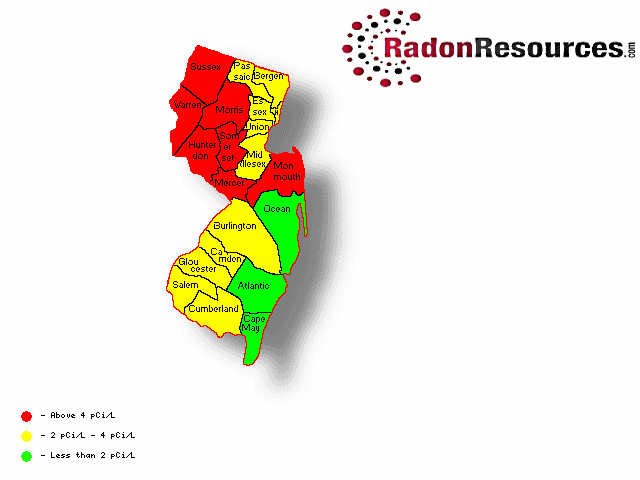New Jersey Radon Information
New Jersey Radon Program:
Radon Website: WebsiteRadon Contact: Anita Kopera
Active Radon Program: Yes
Require License for Radon Professionals: Yes
New Jersey Radon Levels
New Jersey has a user submitted radon level of 5.93. This is based on data submitted from visitors on our site. Learn more here.
EPA Radon Levels
New Jersey has 21 counties and 7 (33%) have been assigned Zone 1 counties by the EPA. Zone 1 counties have the highest potential to have homes test higher than 4 pCi/L. New Jersey's state radon zone average is 1.81, which is the average of all county zone ratings the EPA has assigned the state, ranking it 27 among all states.
The radon levels in New Jersey are well above average in many areas of the state. As such, there’s an increased risk for all homeowners, which is why we recommend testing exposure levels at least twice a year.
New Jersey Radon Mitigation and Testing
Need your home tested for radon? Already know you have high levels and need a radon reduction system installed? Finding qualified radon professionals can be difficult, but we've put together a list of New Jersey contractors to help you save time.
New Jersey Radon Mitigation
We have compiled a list of qualified radon mitigation contractors.
Find Radon Mitigation Contractors here
New Jersey Radon Testing
Need your home or office tested for radon? We have compiled a list of qualified radon testing contractors.
Find Radon Testing Contractors here
New Jersey Radon Map

Zone 1 (1): Potential for radon levels above 4 pCi/L according to EPA
Zone 2 (2): Potential for radon levels between 2 pCi/L and 4 pCi/L according to the EPA
Zone 3 (3): Lowest EPA level with expected radon levels at or below 2 pCi/L
Disclaimer: It is strongly recommended that all households, schools and office spaces test radon levels individually. The EPA Radon Zone data is not an indicator of individual test results, but a guideline for strategic planning. Toxic radon levels can be found in all counties, regardless of their zone rating. While we make efforts to keep this information up to date, it is derived from thirdparty sources which may not be accurate or reflect the most current statistics.
About New Jersey
New Jersey is the fourth smallest state in terms of size, and yet it’s the 11th most populous. It also happens to be the most densely populated state in the country.
New Jersey does have an active radon program, dedicated to educating citizens about the risks associated with the deadly gas. You can find more information on Radon, testing and mitigation at the official page.
